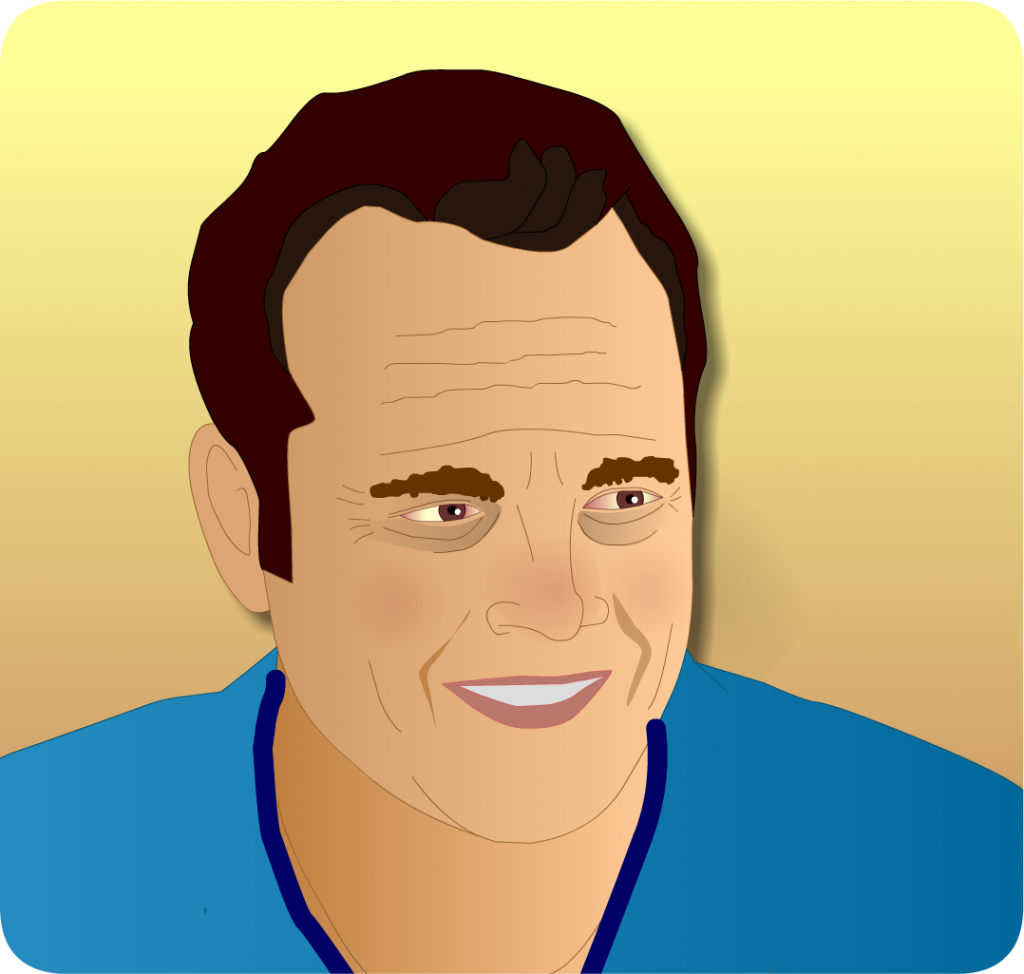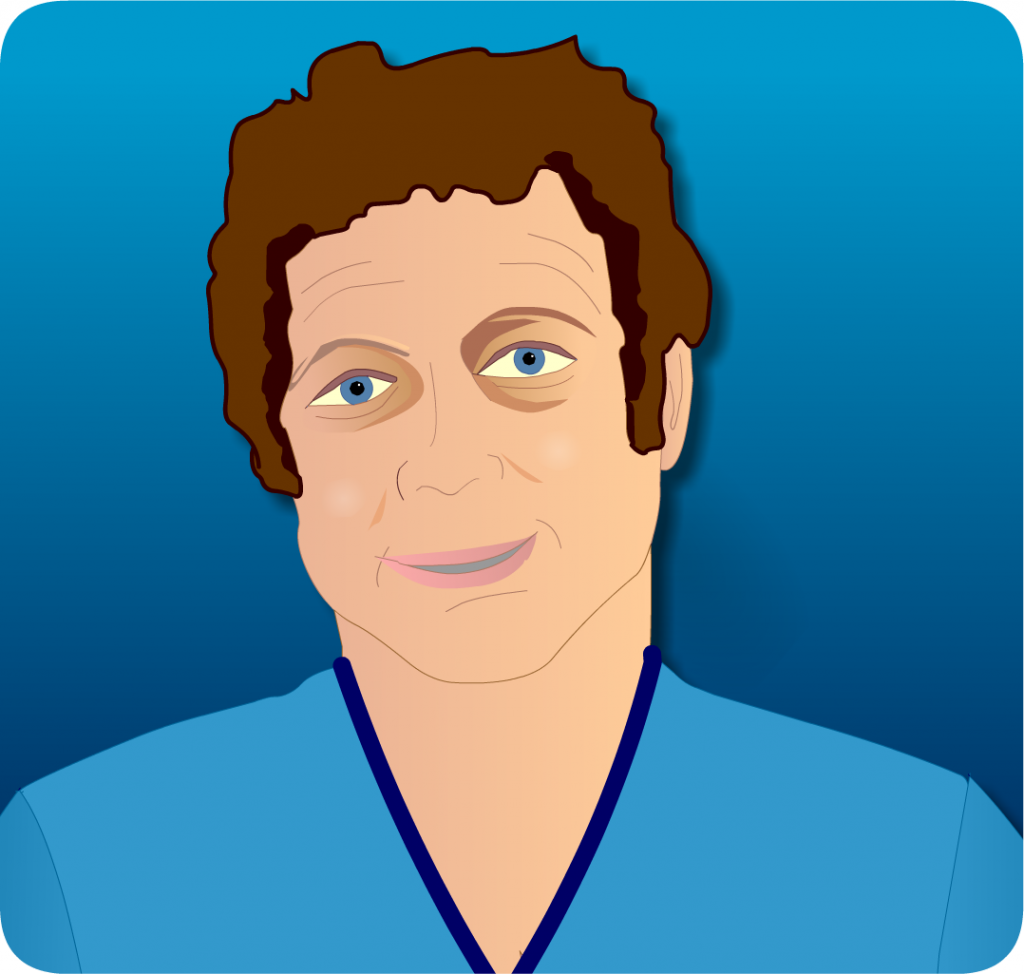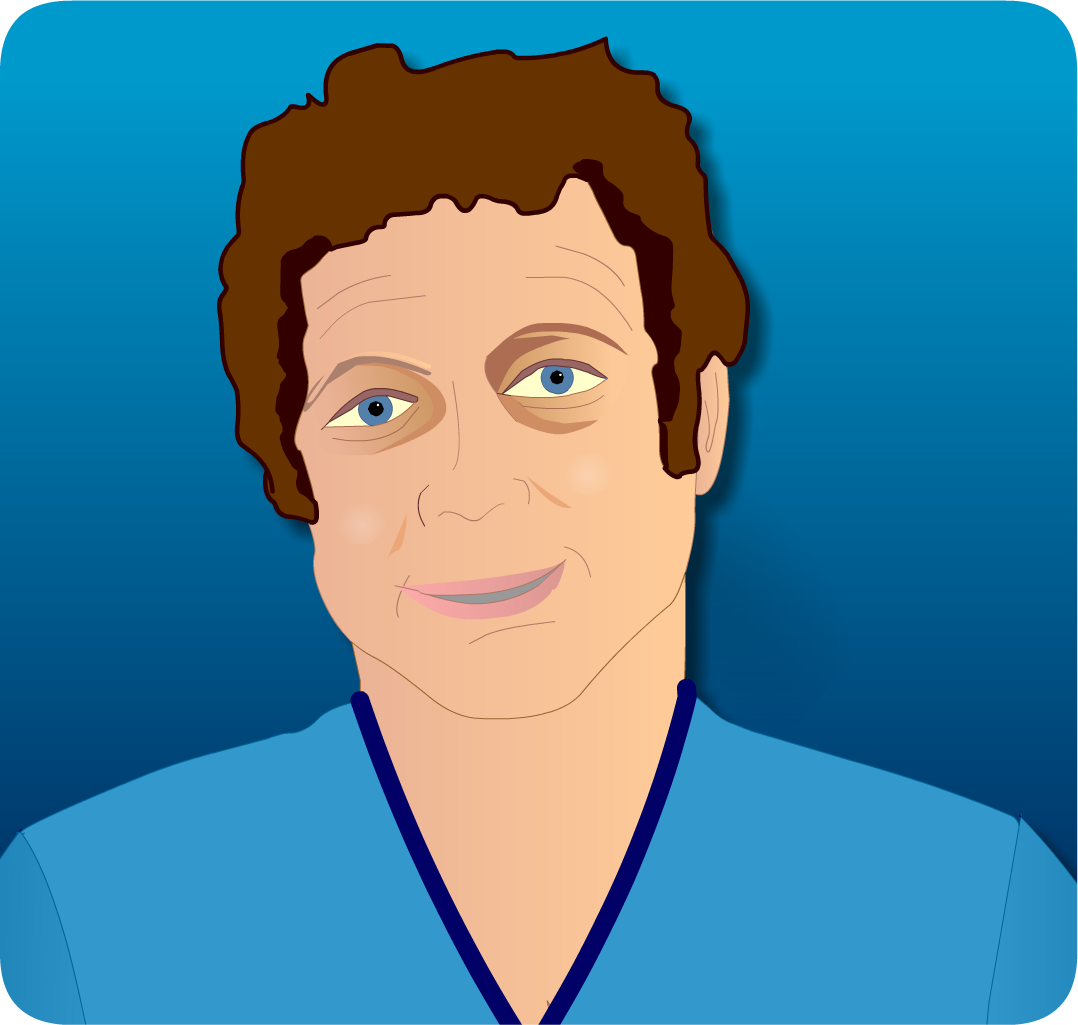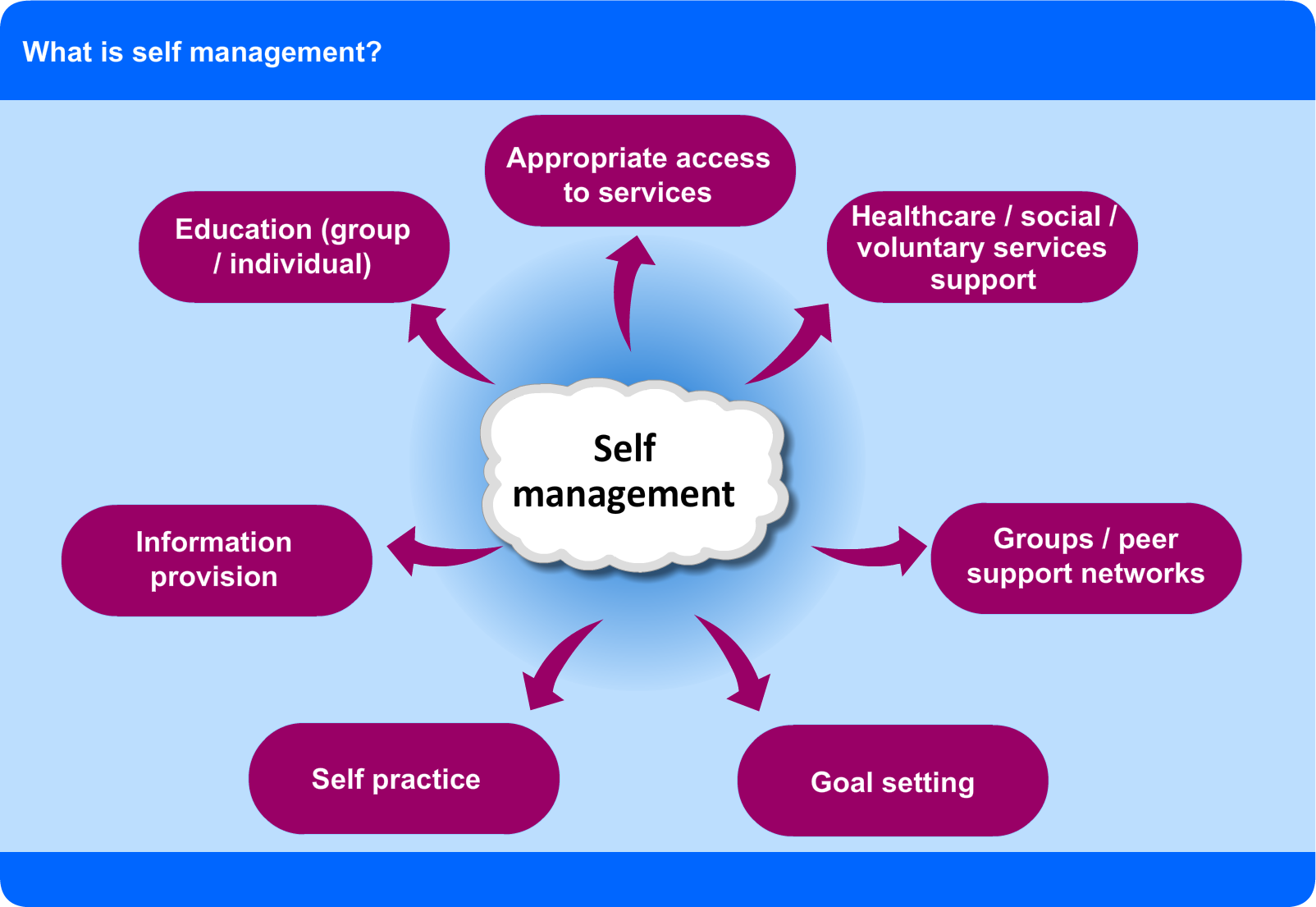

Bob Finlay is a community key worker (see Additional Information box below). He has worked with stroke patients for five years and has completed the stroke core competencies, toolkit and advanced modules. Bob has also undertaken training in patient centred goal setting and applies this whenever possible to his patients in the community.
Bob has Florence, a student nurse, work shadowing him for the week. He explains to her what his role is and how he believes that it is important for people to be able to self manage their own condition. His main goal is to facilitate, encourage and support people in being able to do this. Bob’s experience has shown him that people who gain these skills have a better overall quality of life, are less dependent and make better use of social and healthcare services.
Florence tells Bob about her recent placement in the stroke unit and how she observed patients setting their own goals and doing self practice tasks in the ward. They agree how good it is to see these self management strategies being applied so early on in the rehabilitation process, and that these skills need to be built on once home. Florence is keen to see what different strategies are used in the community and how they differ from those applied in the hospital setting.
Let’s have a look at Bob’s diary for the week …

 Charlie is a recently registered nurse who has been working on the stroke unit for the last 9 months. In that time he has completed the unit’s induction programme which included STARs online training and shadowing other members of the multidisciplinary team (MDT).
Charlie is a recently registered nurse who has been working on the stroke unit for the last 9 months. In that time he has completed the unit’s induction programme which included STARs online training and shadowing other members of the multidisciplinary team (MDT).
The stroke unit implements multidisciplinary goal setting with all its patients and uses nominated key workers to facilitate this. Prior to being a nominated key worker Charlie has received goal-setting training and observed members of the team undertaking key worker roles. He has a named goal setting clinical supervisor who is experienced in the process and will provide him with ongoing support and guidance.
The unit also actively supports and encourages patients to undertake self practice tasks within the ward environment. As one of the key professionals in the MDT, Charlie has a pivotal role in delivering self practice.
The stroke unit recognises the importance and value of engaging people in self management early on in their rehabilitation. This case scenario will focus on patient-centred goal setting and self practice as two examples of supporting engagement in self management.

Charlie Farhead
Charlie is a nurse working in a hospital stroke unit. Along with the rest of the team he has an important role in encouraging self management strategies early on in rehabilitation. Key strategies to support self management are patient centred goal setting and self practice. Work alongside Charlie to see how these are delivered in the unit and what challenges he faces.

Bob Finlay
Bob is a community key worker whose main aim is to support and facilitate the ability of patients to self manage their condition and lives after stroke in the longer term. Like Charlie he also uses goal setting as one of the many possible approaches to supporting self management. Join him for the week and see what self management looks like in the community setting, how Bob tailors it to the needs of his patients and what role he plays.
You can click on the picture to enter a case scenario
NB: There are a number of interactives and quizzes to complete in the module. These will help to check your understanding as you move through the scenarios.
Definition
‘Self management is a person-centred approach in which the individual is empowered and has ownership over the management of their life and conditions. The role of health and social care professionals, services and treatment is to support the person’s journey towards living well in the presence or absence of symptoms.’
(from “Gaun Yersel” The Self Management Strategy for Long Term Conditions in Scotland 2008)

This is not an exhaustive list but includes examples of what self-management may involve. The key component is that the focus is around the patient and carer.
On completion of this module you should:
- Understand what self management is and have knowledge of self management strategies
- Have an awareness of the skills required to deliver self management
- Know how you may support service users to develop and maintain self management skills
- Know how self management approaches differ in hospital and community settings
- Understand that self management is a person centred process that is tailored to the needs of the individual
- Understand the role of goal setting and self practice

Module authors
Module lead
Jane Shiels, Physiotherapy Rehabilitation Services Lead, NHS Lothian
Module group
Anne Armstrong, Occupational Therapist Advanced Practitioner- Stroke, NHS Lanarkshire
Katie Wilkie, Specialist Physiotherapist and CSP Council member, NHS Lothian
Lesley Kane, Community Support Services Regional Manager (West), Chest Heart and Stroke Scotland
Dr Lisa Kidd, Reader in Supported Self-Management (Nursing), University of Glasgow
Tracy Fowler, Acquired Brain Injury Outreach Nurse, NHS Fife
Serena Battistoni, eLearning Interactive Content Developer, Chest Heart & Stroke Scotland
Reviewers
Dr. Julie Duncan Millar, Researcher, School of Medicine, Dentistry & Nursing, College of Medical, Veterinary & Life Sciences, University of Glasgow
Shelley Connon, Physiotherapist, Neurological and Orthopaedic In-patient Rehabilitation Team Lead, NHS Lothian
This module was originally developed by:
Group lead: Jane Shiels, Specialist Physiotherapist, NHS Lothian
Group members: Anne Armstrong, Occupational Therapist Advanced Practitioner- Stroke, NHS Lanarkshire
Dr Alan Harper, Neuropsychologist, NHS Fife
Ben Sutherland, Nurse Consultant, NHS Fife
Katie Wilkie, Specialist Physiotherapist, NHS Lothian
Critical readers: Prof Martin Dennis, Professor of Stroke Medicine, University of Edinburgh
Thérèse Jackson, Consultant Occupational Therapist in Stroke, NHS Grampian
Alison Kirkman, Community Physiotherapist, NHS Fife
Dr Marion Murray, Clinical Neuropsychologist, NHS Lothian
Margaret Somerville, Director of Advice & Support, Chest Heart & Stroke Scotland
Paula Young, Clinical Specialist Occupational Therapist in Stroke, NHS Highland
Introduction
On completion of this module you should have a critical understanding of what self management is and the strategies which may be used in the process of self management.
The answers to all the test questions are contained within the module. This information may be provided in the ‘Interactive Quizzes’ or ‘Additional Information’ boxes on some of the pages.

Having completed of this module, you will now:
Supported communication
- Understand what supported communication is and how to use with someone who has aphasia.
- Know about the level of disability that arises for an individual who requires support with communication.
- Be able to recognise the most appropriate resources and strategies to use with an individual to support their specific communication needs.
Right hemisphere communication difficulties
- Understand the specific communication difficulties that occur after a right hemisphere stroke.
- Know about the appropriate strategies and resources to use with someone who has right hemisphere communication difficulties.
- Be aware of the social, psychological and emotional consequences that occur due to a right hemisphere communication difficulty and how they affect the individual and their family/carers.
Living with a communication difficulty
- Understand how the communication difficulties aphasia and dysarthria impact on everyday life for an individual and their family/carers.
- Know about the resources, support networks and equipment available to live with a communication difficulty.
- Understand the longer term issues of living with a communication difficulty such as employment, leisure activities and psychological adjustment.
As well as support from SLT and stroke neuropsychology when it is required, there are other agencies which may be able to offer support to people affected by communication difficulties after stroke. These include:
Aphasia
- aphasiaalliance.org – People with aphasia helping each other to become independent, communicating with other aphasic people and overcoming aphasia together.
- www.stroke.org.uk – In April 2015 we joined forces with national aphasia charity Speakability (Action for Dysphasic Adults) to ensure that more people across the UK living with aphasia receive vital support.
Stroke
- www.chss.org.uk – Chest Heart & Stroke Scotland improves the quality of life for people in Scotland affected by chest, heart and stroke illness, through medical research, influencing public policy, advice and information and support in the community.
- www.stroke.org.uk – We believe in life after stroke. That’s why we support stroke survivors to make the best possible recovery they can. It’s why we campaign for better stroke care. And it’s why we fund research into stroke.
Carers
- www.carers.org.uk Carers Trust – Our vision is a world where the role and contribution of unpaid carers is recognised and they have access to the quality support and services they need to live their own lives.
- www.carersscotland.org – A charity set up to support people who care for an elderly relative, a sick friend or a disabled family member.
- www.crossroads-scotland.co.uk – Providers of home based respite through short breaks/longer periods of support for 8,500 carers, and personal care for individuals finding it difficult to cope living alone, through our 42 services across Scotland.
- www.stroke4carers.org – This e-learning resource provides a set of topics which will provide on-line advice, support and information for informal carers.
There may also be local services/support agencies – a stroke specialist nurse will be able to provide information about these.



 Charlie is a recently registered nurse who has been working on the stroke unit for the last 9 months. In that time he has completed the unit’s induction programme which included STARs online training and shadowing other members of the multidisciplinary team (MDT).
Charlie is a recently registered nurse who has been working on the stroke unit for the last 9 months. In that time he has completed the unit’s induction programme which included STARs online training and shadowing other members of the multidisciplinary team (MDT).





